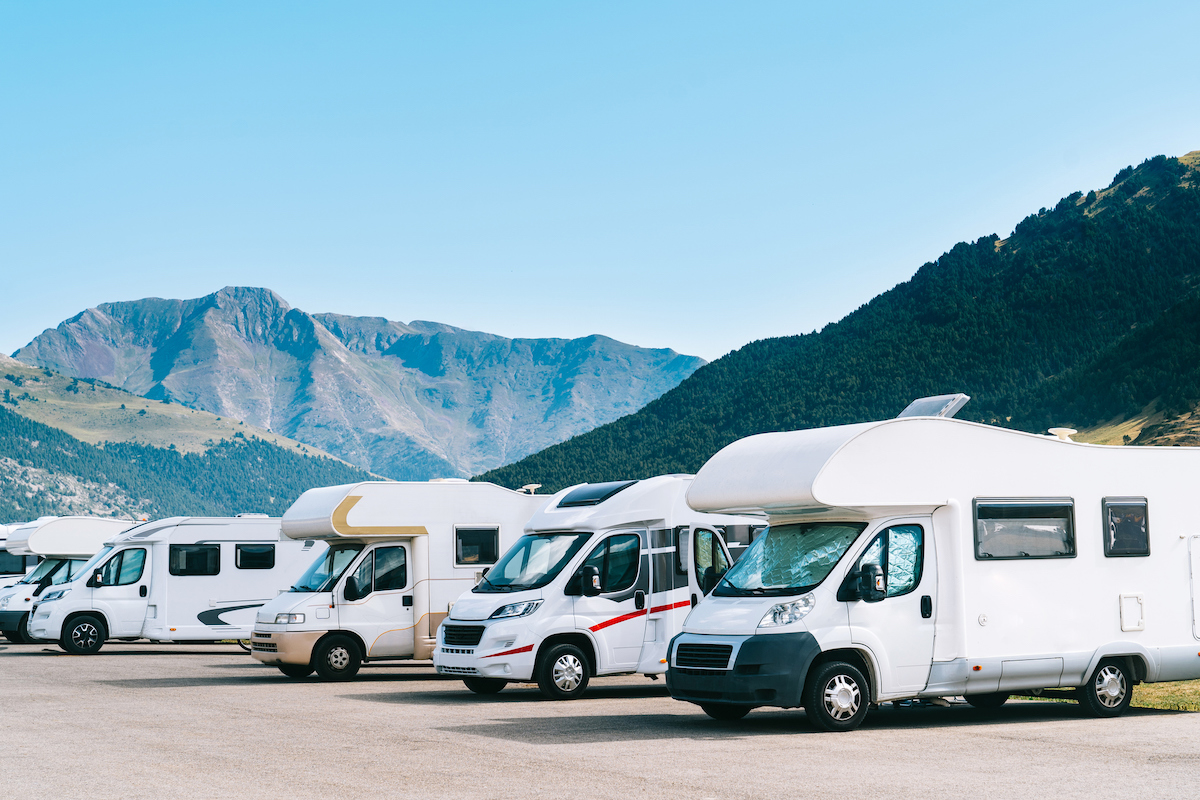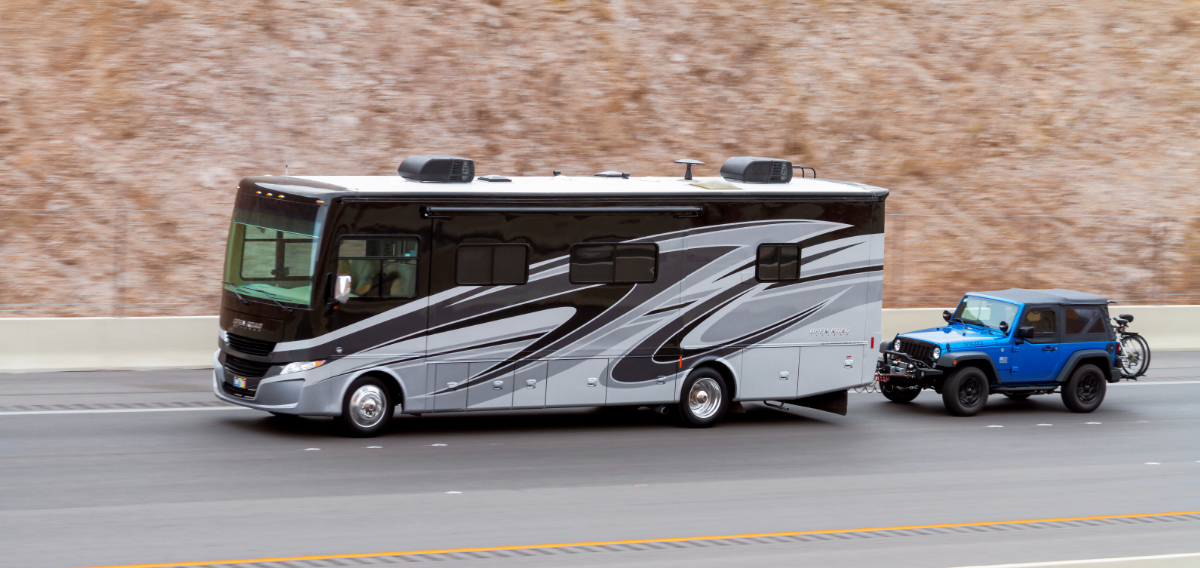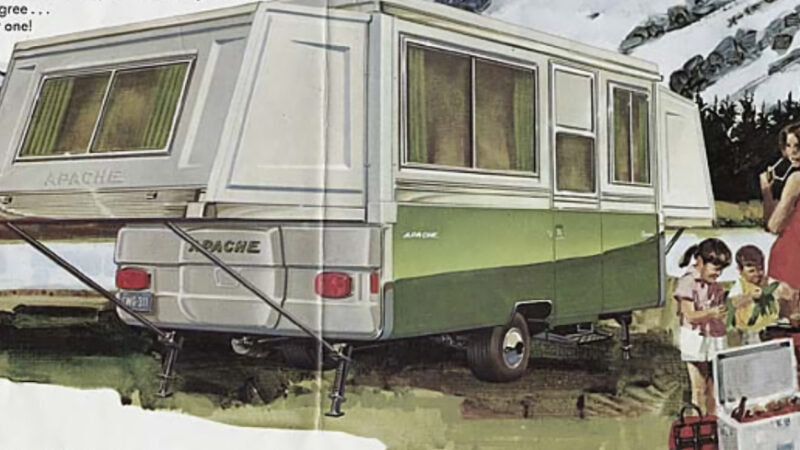Everything You Need to Know About the California RV Ban
If you’ve been keeping up with current events in the RV industry lately, you’ve probably heard about California’s so-called motorhome ban that is set to go into effect on January 1, 2025. Because of the complicated and somewhat fluid nature of this story, there have been a lot of rumors and misinformation circulating online. Understandably, this has led to plenty of speculation and concern from the RV community, as we all wait to see how things sort out.
So what’s at the heart of this ban and how will it impact consumers? We’ve sifted through as much information as we can to get to the bottom of those questions. Here’s what you need to know about the California RV ban.

Image Courtesy of Andrey Armyagov/Shutterstock
Is California Banning RVs?
Let’s start with the most obvious question; is the state of California actually banning RVs? The short answer is yes, and no. Let us explain.
Back in 2021, the state of California, under the advisement of the California Air Resource Board (CARB), passed a piece of legislation known as the Advanced Clean Trucks (ACT) regulation. The goal of ACT is to cut the level of emissions produced by medium-duty and heavy-duty trucks by banning the sale of vehicles built on large chassis like those produced by Freightliner, Spartan, and Ford. And while those platforms are mostly used to build trucks to haul cargo, they’re also commonly found in large RVs, too.
ACT prevents the sale of any vehicle built on those chassis starting with the 2024 model year and moving forward. The good news is chassis manufacturers can elect to purchase carbon credits or sell electric vehicles to help offset their diesel and gas-powered models. In theory, this could allow them to continue selling their platforms in California, but unfortunately, most of those manufacturers—with the exception of Ford—don’t have electric vehicles to help balance out their ledger. Because of this, we could see a ban on motorhome sales starting early next year.
It is also important to note that these regulations only apply to new vehicles starting with the 2024 model year. If you already own a medium-duty or heavy-duty truck or large motorhome, California isn’t coming to take it away from you. It is only preventing the sale of new models that fall into those categories.

Summer tourism with RV in the mountain. Campers parked in a row in a caravan parking area. Best option for travel. Motorhomes and campingcar. (Summer tourism with RV in the mountain. Campers parked in a row in a caravan parking area. Best option for t
Which Motorhomes Would Be Banned?
Most of the headlines surrounding a potential California RV ban have centered on Class A motorhomes and, to a lesser extent, Class C models. But the Advanced Clean Truck regulations have clear-cut rules governing exactly which vehicles are covered based on weight. Any vehicle with a GVWR of 8,500 lbs. or more are subject to the ban, meaning most Class B camper vans would also be prohibited from being sold.
Under the guidelines, RV dealerships can continue to sell gas and diesel motorhomes, provided they are to customers who intend to register them in another state. In other words, Class A, B, and C models probably won’t just disappear from dealer lots, although those located closer to the state borders are more likely to have them in stock. It all depends on how much business a dealership does with out-of-state customers.
When it comes to banning motorhome sales, California regulations also differentiate between a new and used RV. Based on the ACT regulations, a “new” vehicle is one that has less than 7,500 miles, which makes it more likely to be banned. Those with more than 7,500 miles fall into the “used” category and may be resold to consumers.
And to be clear, the RV industry isn’t the only one struggling with these new regulations, which govern the use of all large vehicles with a combustion engine. In addition to the trucking industry, school buses, emergency response vehicles, tow trucks, delivery trucks, and other commercial vehicles are all impacted.

Photo Credit: sanfel/Getty
Could Other States Ban Motorhomes, Too?
Since it was CARB that drafted these regulations, California is obviously the first state in the country to adopt them. But there are ten other states that have also signed on for the ACT regulations, meaning these bans could be coming to other places in the future.
Joining California in 2025 are Massachusetts, New Jersey, New York, Oregon, and Washington. In 2026, Vermont will also begin enforcing these rules, while Colorado, Maryland, New Mexico, and Rhode Island will follow suit in 2027. Some of those states are considering delaying adoption to further study the economic impact; however, so there may be a grace period during which RVs and other large vehicles will remain on sale.
It is possible that some of those states could choose to back out of the ACT regulations or draft their own with carve outs for RVs, fire trucks, ambulances, and other large vehicles. But if they do stick with the Advanced Clean Truck guidelines, they must accept all of the provisions, meaning they can’t pick and choose which elements the decide to enforce. It is either all, or nothing.

Image Courtesy of guy-ozenne/Getty
What If I Buy My RV in Another State, Then Move to California
If you live in another state and have an RV that is a 2025 model year or newer, then move to California, you can register the vehicle provided it has proper labeling and reporting by the manufacturer. In other words, the motorhome (or truck or bus) will have to be compliant with the ACT regulations to be accepted, with that responsibility falling on the chassis manufacturer to ensure it adheres to California’s standards.
If you purchase a motorhome that isn’t ACT compliant, you probably won’t be able to register it in California. Manufacturers will have to follow strict guidelines for certification and report tracking demonstrating that they are meeting those requirements, including showing their carbon offsets or electric vehicles sales in the state of California. For some of those manufacturers, that may require a lot of effort and expense, but that should allow owners to demonstrate compliance and properly register their RVs.
As noted, all of the other states that adopt the ACT regulations must accept those guidelines in full. In other words, if you can’t register a new motorhome in California, you won’t even be able to do so in any of the states that are implementing these new rules. In 2025, that currently means new gas or diesel RVs with a GVWR of over 8,500 lbs. can’t be registered in Massachusetts, New Jersey, New York, Oregon, and Washington, barring any changes to the rollout date.

Photo Credit: cookelma/Getty
Is There Any Hope of the RV Ban Being Lifted?
While much of this news sounds dire, there is some hope that RVs—and potentially other types of specialty vehicles—will eventually get an exemption from the ACT rules. CARB has reached out to a number of trade organizations—including the RV Industry Association (RVIA)—to gather more information and to look for possible solutions. After all, the goal is to lower emissions on medium- and heavy-duty trucks, which are sold in much higher volumes than RVs, busses, ambulances, and so on.
That said, as of press time, the state of California is moving ahead with its planned regulations. That means, as of January 1, 2025, most motorhomes will likely be banned from being sold in the state. Massachusetts, New Jersey, New York, Oregon, and Washington are likely to follow suit, although there is some movement in a few of those states to delay the regulations until 2026 or even 2027. That will buy those state governments time to further review the ACT guidelines and perhaps explore their own solutions independent of the California rules.
As we’ve mentioned a few times, the California RV ban is in a fluid state at the moment. That means things could change in the future, potentially even before the January 1, 2025 deadline. We’ll continue to monitor the situation closely and share important updates in this article as they emerge. And for further information, be sure to check out RVIA’s coverage of the topic, too.
The important thing to know right now is that motorhomes currently on the road are not being banned from use in California or any of the other ACT states. That said, If you are planning to purchase a new motorized RV in the near future, and live in one of the states mentioned above, you’ll want to pay close attention to how this all evolves.
Stay tuned for further updates as we learn more.
The post Everything You Need to Know About the California RV Ban appeared first on RV.com.
Source: https://www.rv.com/rv/everything-you-need-to-know-about-the-california-rv-ban/






